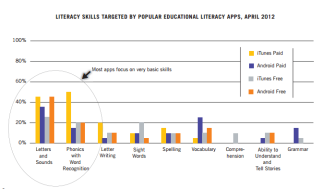My EdTechTeacher colleagues Beth, Greg, and Tom have been pouring over educational apps. Lots and lots of apps. As practitioners, their instinct is that the vast majority of educational apps are terrible. Shovel-ware. Flashcards. Garbage. Tens of thousands of them.
So, we’ve developed a framework for thinking about teaching with tablets that focuses on using a handful of curation and media creation apps: one for annotation, one for curating, one for web browsing, one for audio creation, one for video creation, one for screencasting, and so forth. We have some preferences, but it actually probably doesn’t matter much which apps you choose, as long as you focus on how the tablet empowers students as researchers, curators, and media-makers.
But, of course, our position is based on practitioner-wisdom and experience—both of which I value highly—rather than research—which I also value highly.
So, I looked forward with great anticipation to receiving a report from the Joan Ganz Cooney Center at Sesame Workshop and the New America Foundation on Pioneering Digital Literacy in the Wild West. The paper, by Lindsay Guernsey, Michael Levine, Cynthia Chiong, and Maggie Stevens, evaluates 137 recently published “educational literacy” apps, websites, and e-books. Their findings are neatly summed in this figure (from page 8):

In short, their systematic evaluation of the app marketplace coheres with my colleague’s scan: most apps out there are targeting basic skills and basic forms of learning. Of course, early-literacy and primary and secondary instruction are all different, and this study examined inputs rather than learning outcomes, but I’m certainly seeing a very strong pattern.
The paucity of rich learning apps suggests that efforts like Common Sense Media’s Learning Ratings are all the more important to help guide parents towards higher quality learning experiences. Even more so, we need to be sure that educators and parents don’t view the iPad as a repository of apps, but rather as a platform for the thoughtful consumption, curation, and creation of high quality media.
For regular updates, follow me on Twitter at @bjfr and for my papers, presentations and so forth, visit EdTechResearcher.
